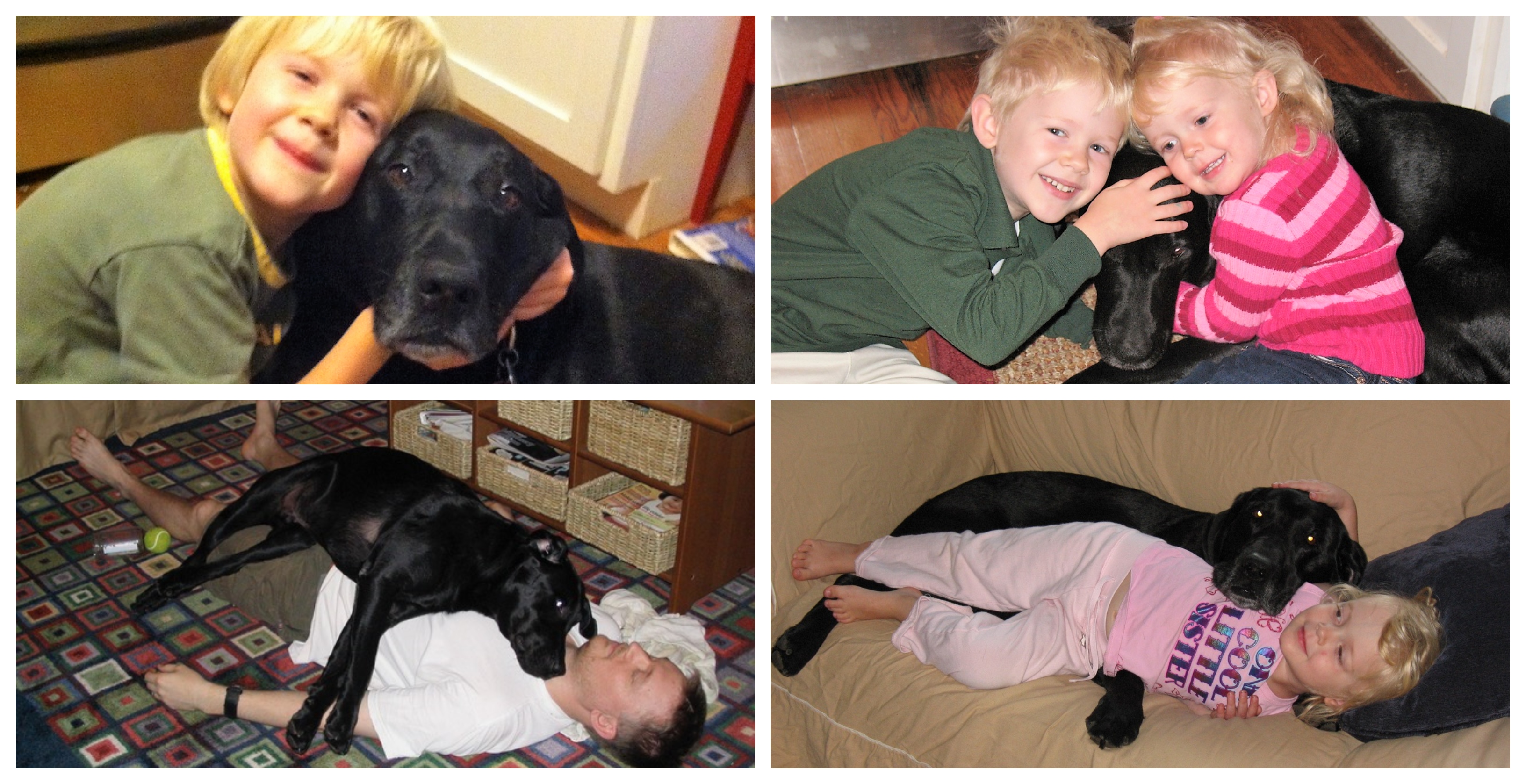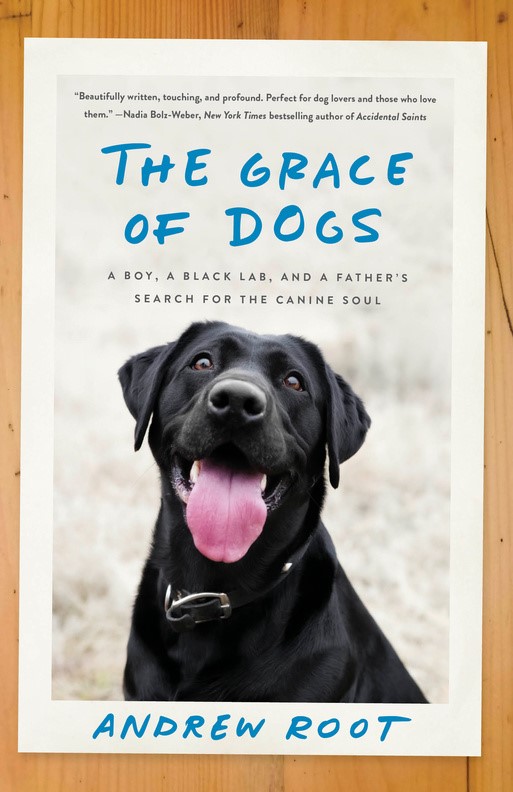Dr. Andrew Root’s search for the canine soul began the day his eight-year-old son led the family in a moving Christian ritual at the burial service for Kirby, their beloved black lab. In the coming weeks, Root found himself wondering: What was this thing we’d experienced with this animal? Why did the loss hurt so poignantly? Why did his son’s act seem so right in its sacramental feel?
Andrew considers these questions in his latest book The Grace of Dogs, a touching and profound exploration of the relationship between human and canine family members.
Tell us about Kirby and your experiences of living life with him.
 My experience living with Kirby, I’m sure, isn’t unique to anyone else who has loved a dog. Kirby came into Kara’s (my wife) and my life while I was working on a PhD in theology. We had only been married a few years and in a real way—that at the time we would have been embarrassed to say—he made us a family. He was opinionated and sweet, and gave our days more structure and deeper joy. Soon enough, our son Owen was born, and then two and half years later our daughter Maisy. They loved Kirby and Kirby loved them. Kirby played with them in our garden and slept every night at Owen’s bedside. The problem with living so beautifully and intimately with a dog is saying good-bye. And that’s where the unique elements of my story kick in. Of course, it isn’t unique to lose a dog or grieve that loss. But what pushed me into writing this book was watching my own child grieve his loss as the vet placed the needle in Kirby’s leg and pushed the merciful poison into his body. Right in the middle of the pain my eight year old son, wiped the tears from his eyes and without any prompting got a small cup of water, dip his finger into it, and placed the sign of the cross on our beloved dead dog, giving Kirby back to God. It was the beautiful act of a child, and I was moved, but also puzzled, by how right it felt. My book is the journey I went on to figure out why it felt so right.
My experience living with Kirby, I’m sure, isn’t unique to anyone else who has loved a dog. Kirby came into Kara’s (my wife) and my life while I was working on a PhD in theology. We had only been married a few years and in a real way—that at the time we would have been embarrassed to say—he made us a family. He was opinionated and sweet, and gave our days more structure and deeper joy. Soon enough, our son Owen was born, and then two and half years later our daughter Maisy. They loved Kirby and Kirby loved them. Kirby played with them in our garden and slept every night at Owen’s bedside. The problem with living so beautifully and intimately with a dog is saying good-bye. And that’s where the unique elements of my story kick in. Of course, it isn’t unique to lose a dog or grieve that loss. But what pushed me into writing this book was watching my own child grieve his loss as the vet placed the needle in Kirby’s leg and pushed the merciful poison into his body. Right in the middle of the pain my eight year old son, wiped the tears from his eyes and without any prompting got a small cup of water, dip his finger into it, and placed the sign of the cross on our beloved dead dog, giving Kirby back to God. It was the beautiful act of a child, and I was moved, but also puzzled, by how right it felt. My book is the journey I went on to figure out why it felt so right.
Do dogs have souls?
The question of the soul is a big one both in both theology and the sciences; whole monographs have been written just trying to get a handle on the word itself. But at its base we assume that soul is some nonmaterial reality that connects us to something outside of us. A soulful person, for example, can listen to music and be moved somewhere beyond him or herself. If we assume that soul is some ability to connect, and connect so deeply that love is experienced and communion shared in, then I think we have to say that dogs are soul-full. All the new science on dogs shows how amazingly they can connect to us, reading us, being drawn to us. There is so much wonder in their ability to read us and their desire to commune with us. No other animal does this (at least not as consistently and innately as a dog). This kind of connecting and “sharing in” I think is soul, and I think is spiritual. In the book I even go so far as to argue that dogs are God’s gift to us, sure, to help us, but more so, to echo back a deep spiritual reality, that we human beings are beautifully and wonderfully made.
Does God relate to animals? Can other people encounter God’s grace through their relationship with animals?
I think God does relate uniquely with animals, I think even with the rest of the creation. The book of Job point to God’s delight in far off places, odd things that God relates to and loves. However, while God relates to other animals, I believe God relates to human beings in a unique way—in a way that has more peril and possibility wrapped up in it. God relates by speaking to us, by calling out to us to be in dialogue with God. Made in this God’s image, our being yearns for connection and communion—whether verbal or nonverbal. The amazing thing about a dog is that it relates to us in this very way, hearing our words and responding to our words. People love and grieve the loss of their dogs so deeply because it was a relationship of discourse; it is the loss of a conversation. (Even if wonderful Clyde the schnauzer never spoke a word back, he paid attention to your words, looked in your eyes when you talked, and responded with joy when you said “walk” or went and hid when you said “bath.” He made you laugh, connecting you to him).

Family fun with Kirby
So my point is that dog are pulled into this deeply unique human spiritual experience. It sounds lame, like it should be on a poster in a 11 year old girl’s bedroom, but I think it is true that dogs are God’s helpers, God’s ministers in the world. And I think this is real grace to experience their compassion and willingness to respond and share in our being. This is why all studies show that dogs improve the well being of people—because they awaken, echo, and fortify our spiritual core.
Do you hope to see Kirby again in the afterlife?
The theologian Dietrich Bonhoeffer once told a 10-year-old boy who asked him it he’d see his dead dog again in heaven that “God doesn’t lose anything that God loves.” I think because dogs give and receive the most sacred thing we have—love. Because this love is so personal, bound in the face to face, in the dialogue of shared life, then yes, I do think I’ll see Kirby again, because heaven is communion; it is eternal shared life of friendship and love. And dogs are unequivocally loving friends!
 Dr Andrew Root is Carrie Olson Baalson Professor of Youth and Family Ministry at Luther Seminary in St Paul MN whose research explores our most common lived experiences for their theological and transcendent depth.
Dr Andrew Root is Carrie Olson Baalson Professor of Youth and Family Ministry at Luther Seminary in St Paul MN whose research explores our most common lived experiences for their theological and transcendent depth.
For more information about Andrew and his work, check out his website.
The Grace of Dogs is available now from Penguin Random House.



